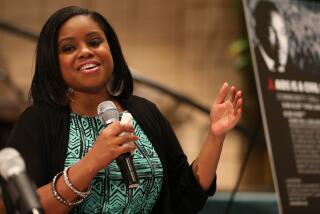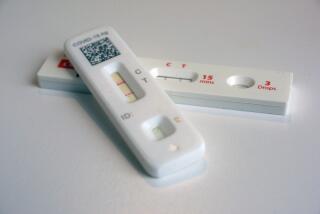Normal Life Returning for Boy Exposed to AIDS
- Share via
Eighteen months ago, Channon Phipps wouldn’t go outside to play because he was afraid his friends didn’t like him anymore.
Last week, the 12-year-old was fidgeting at the kitchen table of his family’s El Toro condominium because he was in a hurry to go skateboarding with his friend, Tommy.
A hemophiliac who has tested positive for AIDS antibodies, Channon spent six months at home before a court order allowed him to return to Rancho Canada Elementary School in February, 1986. Since then, things have pretty much gotten back to normal.
“I’m glad it’s in the past now,” Channon said last week of that grim period in his life. “I don’t even think about it.”
Does Not Have AIDS
Doctors have said Channon does not have acquired immune deficiency syndrome, the usually fatal disease that attacks the body’s system for fending off disease. The presence of the antibodies in his blood means that Channon has been exposed to the AIDS virus. Many who have tested positive have gone on to develop AIDS, but others who have tested positive for the antibodies have yet to develop it.
AIDS is spread through body fluids, primarily through intimate sexual contact and the sharing of unsterilized hypodermic needles, not through casual contact.
Channon’s exposure came through transfusions of blood products contaminated with the AIDS virus, transfusions he must have to replace the clotting agent missing in hemophiliacs.
When Channon returned to school last year, most schoolmates treated him like just another kid in class, although there were protests from some parents who feared that their children could catch AIDS from the youngster.
Channon said just two of his friends knew why he was staying home until his aunt and legal guardian, Deborha Franckewitz, filed suit to get him readmitted to school in November, 1985. The Saddleback Valley Unified School District had refused to allow Channon to attend school while it was developing an AIDS policy; instead, the district provided tutoring for him at home.
“I stayed inside most of the time,” Channon recalled. “It was boring staying home. I mostly watched TV. I wouldn’t go outside and play because I was afraid my friends wouldn’t like me.”
On his first day back in school in February, 1986, Channon said, he was excited and nervous. But he found that his anxiety was unwarranted. “Everybody treated me like a normal kid,” he said.
Rancho Canada Principal Evelyn Campbell concurred, saying that students were very receptive to Channon’s return.
They Take Care of Him
“He’s a very popular young man,” Campbell said. “He has a lot of friends who are very good to him. They know he’s a hemophiliac, and they kind of take care of him--they make sure he doesn’t get hit with a ball (when they’re playing).”
Campbell said she hasn’t had complaints from parents about Channon’s presence in school this year, emphasizing that most parents and teachers are very supportive of him.
“He’s an average, normal, robust, young man,” she said. “He’s very, very, very mannerly.”
Channon spends an extra hour a day in his sixth-grade class to catch up on what he missed while he was out of school. His says his favorite class periods in school are math, library time and computer time; reading is his least favorite.
He likes to draw, has a skateboard and a bike, and he took up surfing last month with his family. It is readily apparent that the threat of developing AIDS does not dominate his life.
Yet, there are reminders.
Last fall, when the new school year began, Franckewitz said, a student new to the area told her 8-year-old stepson, Christopher, “You have AIDS, your brother has AIDS--get away.”
Another time, Franckewitz said, a group of children were discovered playing, “AIDS tag,” modeled after freeze tag.
“I don’t think it was meant as a reflection on Channon in any way,” Franckewitz said, adding that school officials put a stop to the game as soon as they found out about it.
Shook His Hand
Michael Rowe, a friend of Channon who goes to the junior high school that Channon will attend in the fall, said Channon’s name was brought up during a class discussion about AIDS.
Most of the students had good things to say about Channon, said Michael, who added that at the end of the talk, he stood up and told his classmates about his friendship with Channon.
Michael said the teacher asked him if he had played with Channon after he found out that Channon had tested positive for AIDS antibodies. When Michael said he had, the teacher walked over and shook his hand.
Michael said that he and Channon have been friends for four years, that he never once stopped playing with him.
As for Channon, he is looking forward to starting junior high school. Students from several other elementary schools will also be going there, but he said he doesn’t think any of the new kids will treat him differently. He hoped his experiences will help educate others about AIDS.
Afraid at First
One way Channon will reach others, Franckewitz said, is through an educational film he recently made that is expected to be ready for viewing in June.
Franckewitz, 30, said she was afraid at first to sue the school district because she thought publicity might hurt Channon’s chances of returning to school. But since she was not satisfied with how the district was responding to her requests, she decided to go ahead with the suit.
“Going public with the whole thing helped a lot,” Franckewitz said. “It helped us emotionally. We didn’t have anything to hide anymore.”
There were times when he had doubts, Channon admitted, and he said he often thought about whether they would win the lawsuit. But he said he is glad they went to court and would encourage others in a similar position to do the same.
“Fight for it,” Channon advised. “Just keep on going like I did.”
More to Read
Sign up for Essential California
The most important California stories and recommendations in your inbox every morning.
You may occasionally receive promotional content from the Los Angeles Times.










